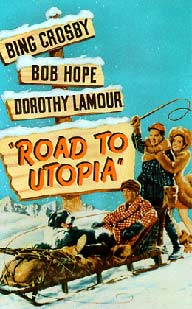|
Craig White's Literature Courses Terms / Themes |
|
|
America's Utopian Pasts |
America's utopian pasts are often associated with its creation / origin stories; utopian ideas or movements are often associated with millennial or apocalyptic ideas or stories.
Two conflicting or complementary ideas of America contend in its utopian vision.
The "progressive" or "liberal" utopia values "a more perfect union" in the larger community--e.g., the progressive movement, social security, public education.
The "reactionary" or "conservative" utopia mistrusts large public social structures like government, preferring private institutions like the family (home schooling), small businesses, churches, neighborhoods--"voluntary" organizations.
These two types or dimensions of utopia sometimes come together, especially at "original moments" like the Pilgrims or the Founders.
Candidates:
Genesis before the fall: humans close to god and nature; no conflict or sin; needs met with minimal labor; man & woman as God's family; sin condemns man and woman to distinct forms of labor. (Common to all western civilization, but refreshed for Americans through rediscovery of "garden" that Europeans had not yet entered. Compare Columbus's first letter.)
The "Early Church" or Apostolic Generation--the communal, family-like generation who remembered Christ, shared meals and goods, and awaited the Messiah's return. (Important to Protestant Reformation, which attempted to bypass centuries of Catholic tradition to return to "original" Christian community; remains a model for evangelical Christianity--many new churches or denominations attempt to reinstate "the first church"; the millennium or apocalypse is included b/c Christ was to return in the Apostle's lifetimes.)
The Pilgrims as Protestant founding or creation/origin story for Anglo-America: community prays together; harmonious co-existence with Indians; wives and children included (in contrast to mostly-male Catholic explorers / settlers); Pilgrims and Puritans were conversant with millennial or apocalyptic themes of the end-times.
The Founding Fathers: "Founding" = "Creation" or "Origin"; much like the Protestant Reformation rejecting Catholic traditions, the American Revolution rejected differential rights by class with universal human rights.
Arguing points re Founders' original values:
-
American Revolution replaces class with ethnicity or race; ignores gender; but starts a revolution of rights that hasn't stopped yet.
-
Were the Founders "Godly men" (popular evangelical phrase) or did they separate church and state?
Later candidates?
Gilded Age: late 1800s, no regulations or taxes, rich get richer (with occasional philanthropy) and poor get poorer; middle-class a transition for rising and falling
New Deal: 1930s-50s; rise of common people and middle class; progressive taxation and mixed economy
1950s: post-war family values; sexual innocence / ignorance, segregation
Sixties: peace and love, desegregation, Civil Rights
Reagan Era: reaction; return to family values and Gilded Age reduction of taxes and regulations
